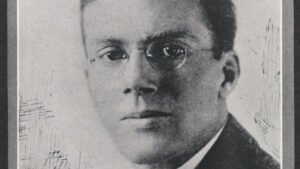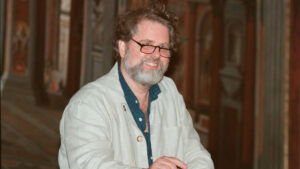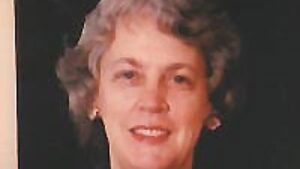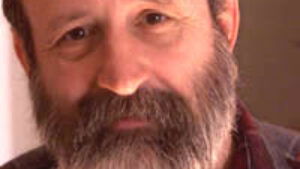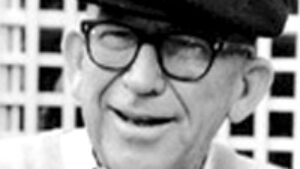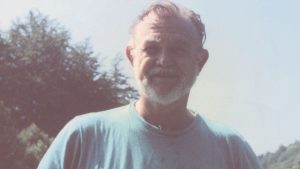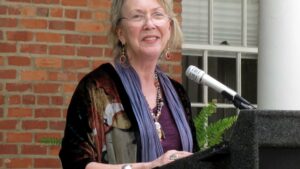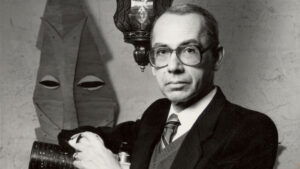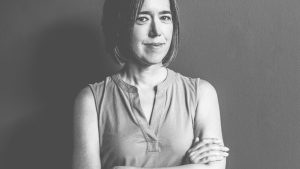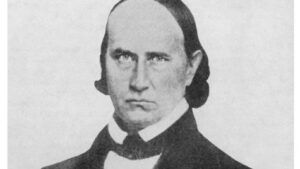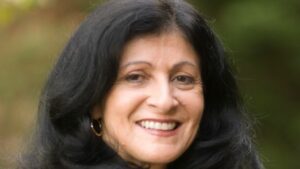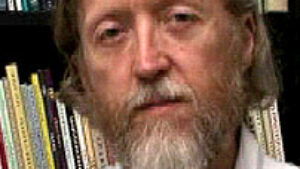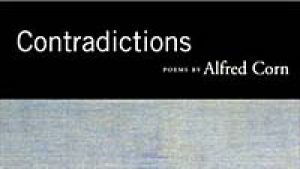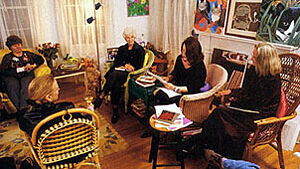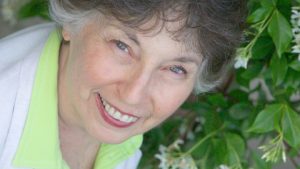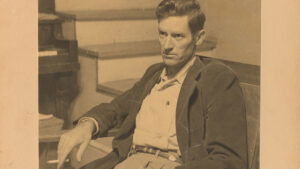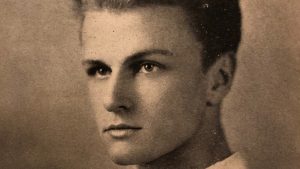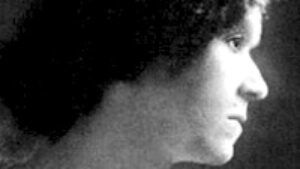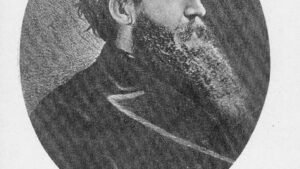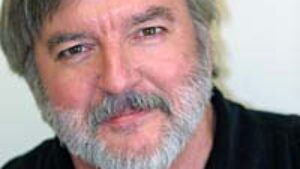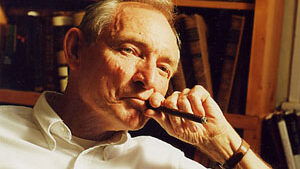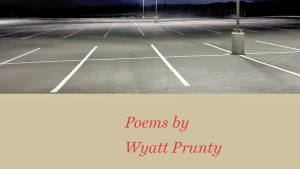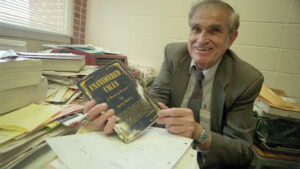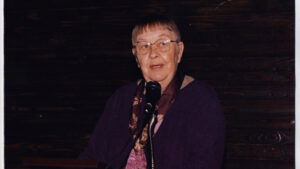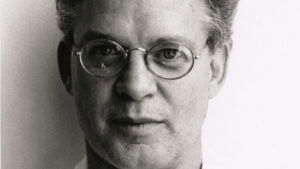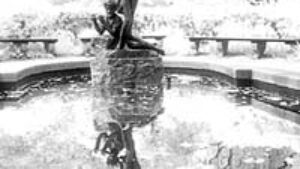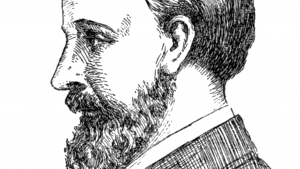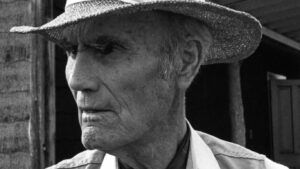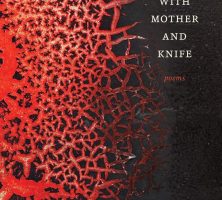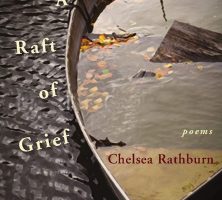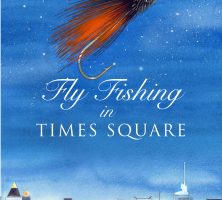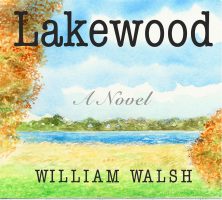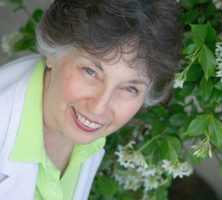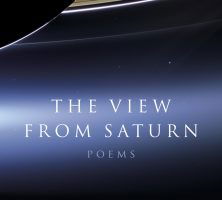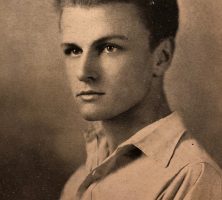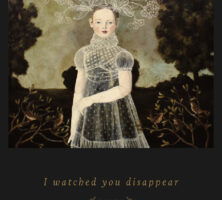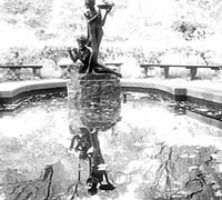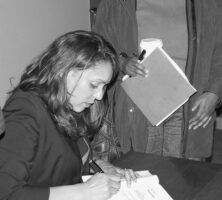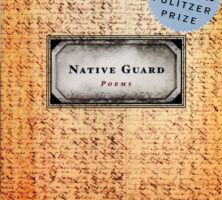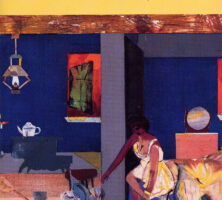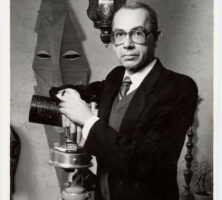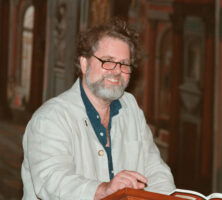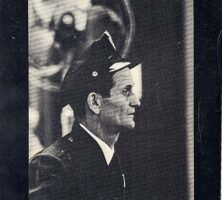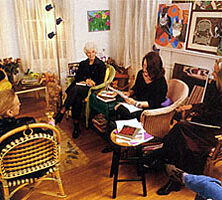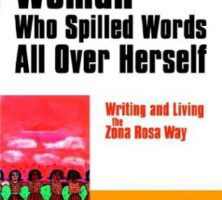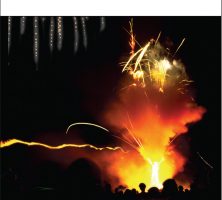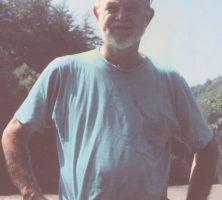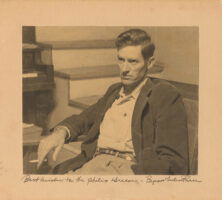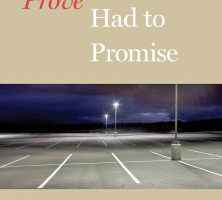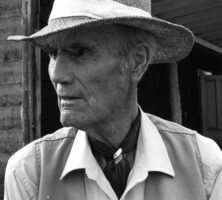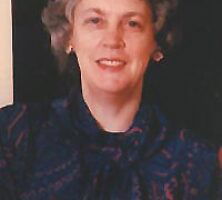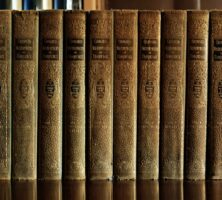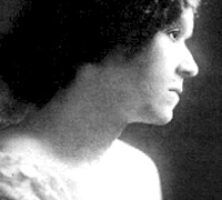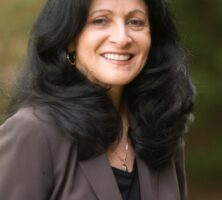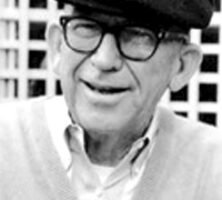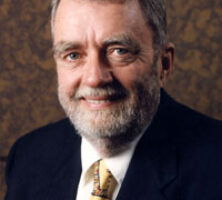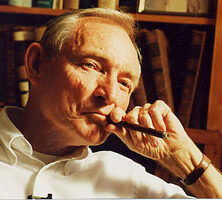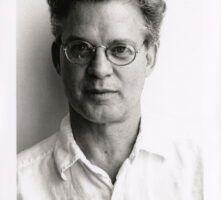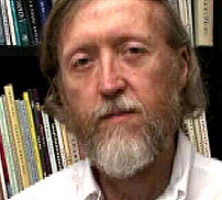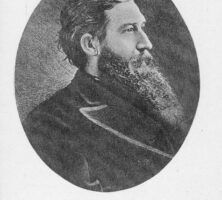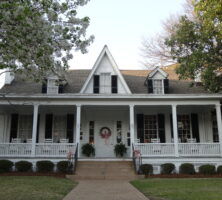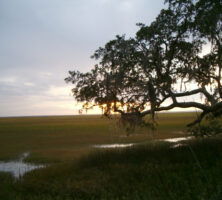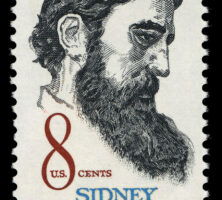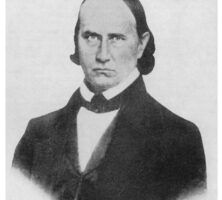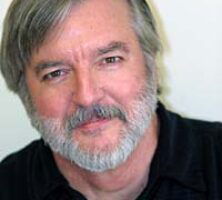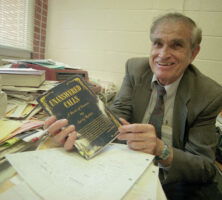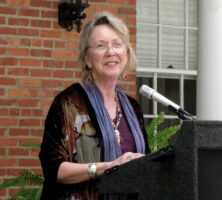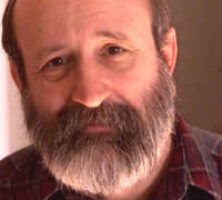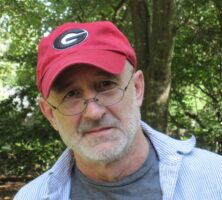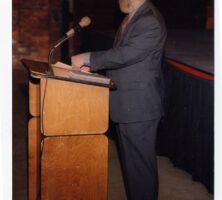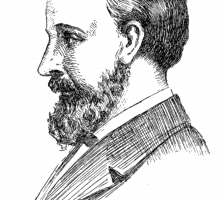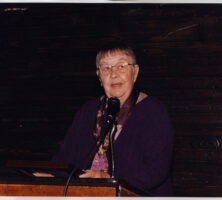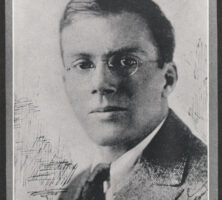The New Georgia Encyclopedia is supported by funding from A More Perfect Union, a special initiative of the National Endowment for the Humanities.
Award-winning author and Poet Laureate of Georgia Chelsea Rathburn has served as an ambassador for the literary arts at events across the state. Since 2019, Rathburn has taught creative writing at Mercer University in Macon and continues to work actively in Georgia's literary community.
From Chelsea Rathburn
The New Georgia Encyclopedia does not hold the copyright for this media resource and can neither grant nor deny permission to republish or reproduce the image online or in print. All requests for permission to publish or reproduce the resource must be submitted to the rights holder.
In her third collection of poems, Still Life with Mother and Knife (2019), Chelsea Rathburn navigates themes of women's sexuality, mental health, and healing from adolescence to adulthood. The collection was named one of the "Books All Georgians Should Read" by the Georgia Center for the Book and received the 2020 Eric Hoffer Book Award in Poetry.
From Chelsea Rathburn
The New Georgia Encyclopedia does not hold the copyright for this media resource and can neither grant nor deny permission to republish or reproduce the image online or in print. All requests for permission to publish or reproduce the resource must be submitted to the rights holder.
Chelsea Rathburn's second book, A Raft of Grief (2013), was awarded the 2012 Autumn Press Poetry Prize. In this collection, Rathburn abandons iambics and rhyme in her exploration of personal themes such as marital dysfunction, alcoholism, self-reclamation, and love.
From Chelsea Rathburn
The New Georgia Encyclopedia does not hold the copyright for this media resource and can neither grant nor deny permission to republish or reproduce the image online or in print. All requests for permission to publish or reproduce the resource must be submitted to the rights holder.
William Walsh's award-winning book of poetry, Fly Fishing in Times Square (2020), centers on themes of place and memory as the speaker seeks to reconcile their past and present.
Courtesy of William Walsh
The New Georgia Encyclopedia does not hold the copyright for this media resource and can neither grant nor deny permission to republish or reproduce the image online or in print. All requests for permission to publish or reproduce the resource must be submitted to the rights holder.
Author, professor, and editor William Walsh is known for his work as a southern narrative poet and as an interviewer of contemporary authors.
Courtesy of William Walsh
The New Georgia Encyclopedia does not hold the copyright for this media resource and can neither grant nor deny permission to republish or reproduce the image online or in print. All requests for permission to publish or reproduce the resource must be submitted to the rights holder.
William Walsh's second book, Lost in the White Ruins (2014), examines childhood, regrets of loss, and the search "to find what makes us whole."
Courtesy of William Walsh
The New Georgia Encyclopedia does not hold the copyright for this media resource and can neither grant nor deny permission to republish or reproduce the image online or in print. All requests for permission to publish or reproduce the resource must be submitted to the rights holder.
William Walsh's first novel, Lakewood, was published in 2022.
Courtesy of William Walsh
The New Georgia Encyclopedia does not hold the copyright for this media resource and can neither grant nor deny permission to republish or reproduce the image online or in print. All requests for permission to publish or reproduce the resource must be submitted to the rights holder.
Alice Friman entered the Georgia literary scene in 2001 when she read her work for the Georgia Poetry Circuit. A prolific and accomplished writer, she has earned numerous awards including the Pushcart Prize and the Ezra Pound Poetry Award.
Photograph by Lillian Elaine Wilson
The New Georgia Encyclopedia does not hold the copyright for this media resource and can neither grant nor deny permission to republish or reproduce the image online or in print. All requests for permission to publish or reproduce the resource must be submitted to the rights holder.
In her book The View From Saturn: Poems (2014), Alice Friman explores loss, existentialism, and the natural world.
The New Georgia Encyclopedia does not hold the copyright for this media resource and can neither grant nor deny permission to republish or reproduce the image online or in print. All requests for permission to publish or reproduce the resource must be submitted to the rights holder.
Poet and Bozart Press publisher Ernest Hartsock was an important figure in Atlanta's literary community during the 1920s.
Courtesy of Philip Weltner Library, Oglethorpe University.
The New Georgia Encyclopedia does not hold the copyright for this media resource and can neither grant nor deny permission to republish or reproduce the image online or in print. Requests for permission to publish or reproduce the resource should be submitted to the Philip Weltner Library at Oglethorpe University.
Anya Krugovoy Silver, a poet and longtime professor at Mercer University, was the author of four collections of poetry. She was named a Guggenheim Fellow in 2018.
Photograph from Mercer University
The New Georgia Encyclopedia does not hold the copyright for this media resource and can neither grant nor deny permission to republish or reproduce the image online or in print. All requests for permission to publish or reproduce the resource must be submitted to the rights holder.
Silver's second book, I Watched You Disappear (2014), won the Georgia Author of the Year award for poetry.
The New Georgia Encyclopedia does not hold the copyright for this media resource and can neither grant nor deny permission to republish or reproduce the image online or in print. All requests for permission to publish or reproduce the resource must be submitted to the rights holder.
Southern Poetry Review, one of the oldest literary journals in the Southeast, was founded in Florida in 1958 and has been based at Armstrong State University in Savannah since 2002. Pictured is the cover of the journal's fall 2006 issue, featuring a photograph by Dave Beckerman entitled The Secret Garden.
The New Georgia Encyclopedia does not hold the copyright for this media resource and can neither grant nor deny permission to republish or reproduce the image online or in print. All requests for permission to publish or reproduce the resource must be submitted to the rights holder.
Natasha Trethewey was named poet laureate of the United States in 2012. A native of Mississippi, Trethewey graduated from the University of Georgia in 1989. Her third volume of poetry, Native Guard, won the Pulitzer Prize in 2007.
Courtesy of Emory University
The New Georgia Encyclopedia does not hold the copyright for this media resource and can neither grant nor deny permission to republish or reproduce the image online or in print. All requests for permission to publish or reproduce the resource must be submitted to the rights holder.
Poet Natasha Trethewey signs books following a reading at the University of Georgia on January 16, 2008. Trethewey read selections from Native Guard, which won the Pulitzer Prize for poetry in 2007.
Photograph by Sarah E. McKee, New Georgia Encyclopedia
The New Georgia Encyclopedia does not hold the copyright for this media resource and can neither grant nor deny permission to republish or reproduce the image online or in print. All requests for permission to publish or reproduce the resource must be submitted to the rights holder.
Natasha Trethewey, a graduate of the University of Georgia and professor at Emory University, won the Pulitzer Prize in poetry for her third collection of poems, Native Guard (2006).
The New Georgia Encyclopedia does not hold the copyright for this media resource and can neither grant nor deny permission to republish or reproduce the image online or in print. All requests for permission to publish or reproduce the resource must be submitted to the rights holder.
Domestic Work (2000), by Natasha Trethewey, was selected by former U.S. poet laureate Rita Dove to be the first winner of the Cave Canem Prize, awarded each year to the best first collection of poems by an African American poet.
The New Georgia Encyclopedia does not hold the copyright for this media resource and can neither grant nor deny permission to republish or reproduce the image online or in print. All requests for permission to publish or reproduce the resource must be submitted to the rights holder.
Poet Alfred Corn's collection Contradictions was published in 2002 by Copper Canyon Press. Corn, born in Bainbridge, has published several collections of poetry as well as essays, translations, and other writings.
The New Georgia Encyclopedia does not hold the copyright for this media resource and can neither grant nor deny permission to republish or reproduce the image online or in print. All requests for permission to publish or reproduce the resource must be submitted to the rights holder.
The New Georgia Encyclopedia does not hold the copyright for this media resource and can neither grant nor deny permission to republish or reproduce the image online or in print. All requests for permission to publish or reproduce the resource must be submitted to the rights holder.
The New Georgia Encyclopedia does not hold the copyright for this media resource and can neither grant nor deny permission to republish or reproduce the image online or in print. All requests for permission to publish or reproduce the resource must be submitted to the rights holder.
The New Georgia Encyclopedia does not hold the copyright for this media resource and can neither grant nor deny permission to republish or reproduce the image online or in print. All requests for permission to publish or reproduce the resource must be submitted to the rights holder.
Poet Turner Cassity, a Mississippi native, worked for nearly thirty years as a librarian at Emory University's Robert W. Woodruff Library. Cassity's verse tends toward the New Formalist school and offers a broad interpretation of modern "southernness."
The New Georgia Encyclopedia does not hold the copyright for this media resource and can neither grant nor deny permission to republish or reproduce the image online or in print. For more information about this resource, contact the Stuart A. Rose Manuscript, Archives, and Rare Book Library at Emory University.
Coleman Barks, professor emeritus of literature at the University of Georgia, is renowned both for his translations of the thirteenth-century poet Rumi and for his own verse.
Courtesy of University of Georgia Photographic Services
The New Georgia Encyclopedia does not hold the copyright for this media resource and can neither grant nor deny permission to republish or reproduce the image online or in print. All requests for permission to publish or reproduce the resource must be submitted to the rights holder.
The New Georgia Encyclopedia does not hold the copyright for this media resource and can neither grant nor deny permission to republish or reproduce the image online or in print. All requests for permission to publish or reproduce the resource must be submitted to the rights holder.
The New Georgia Encyclopedia does not hold the copyright for this media resource and can neither grant nor deny permission to republish or reproduce the image online or in print. All requests for permission to publish or reproduce the resource must be submitted to the rights holder.
Coleman Barks reads his poem "Some Orange Juice" from the book (1993).
Video by Darby Carl Sanders, New Georgia Encyclopedia
The New Georgia Encyclopedia does not hold the copyright for this media resource and can neither grant nor deny permission to republish or reproduce the image online or in print. All requests for permission to publish or reproduce the resource must be submitted to the rights holder.
Coleman Barks discusses the sophisticated way he attempts to “get out of theway” of himself when translating Rumi’s poetry.
Video by Darby Carl Sanders and Joshua Borger, the New Georgia Encyclopedia.
The New Georgia Encyclopedia does not hold the copyright for this media resource and can neither grant nor deny permission to republish or reproduce the image online or in print. All requests for permission to publish or reproduce the resource must be submitted to the rights holder.
Coleman Barks describes Rumi’s sense of what falling in love means.
Video by Darby Carl Sanders and Joshua Borger, the New Georgia Encyclopedia.
The New Georgia Encyclopedia does not hold the copyright for this media resource and can neither grant nor deny permission to republish or reproduce the image online or in print. All requests for permission to publish or reproduce the resource must be submitted to the rights holder.
Walter Griffin, pictured in 2005, founded the Atlanta Poets Workshop in 1972 and conducted meetings until 1998. Griffin had more than 400 publications to his credit and was named the master poet-in-residence by the Georgia Council for the Arts and Humanities in 1978.
Courtesy of Walter Griffin
The New Georgia Encyclopedia does not hold the copyright for this media resource and can neither grant nor deny permission to republish or reproduce the image online or in print. All requests for permission to publish or reproduce the resource must be submitted to the rights holder.
In 1976 Walter Griffin, an Atlanta poet, published Port Authority: Selected Poems, 1965-1976. Another of his published collections, Night Music (1974), won the International Small Press Book Award and the Georgia Poet of the Year Award.
The New Georgia Encyclopedia does not hold the copyright for this media resource and can neither grant nor deny permission to republish or reproduce the image online or in print. All requests for permission to publish or reproduce the resource must be submitted to the rights holder.
Georgia poet Rosemary Daniell leads a Zona Rosa workshop at her home in Savannah. Daniell founded this creative-writing forum for women in 1981 and christened it Zona Rosa, which is Spanish for "pink zone," in 1983. Similar workshops also operate in Atlanta, Daniell's hometown, and in Charleston, South Carolina.
Courtesy of Southern Living
The New Georgia Encyclopedia does not hold the copyright for this media resource and can neither grant nor deny permission to republish or reproduce the image online or in print. All requests for permission to publish or reproduce the resource must be submitted to the rights holder.
The New Georgia Encyclopedia does not hold the copyright for this media resource and can neither grant nor deny permission to republish or reproduce the image online or in print. All requests for permission to publish or reproduce the resource must be submitted to the rights holder.
The Woman Who Spilled Words All Over Herself (1997) is a writing guidebook for women by Rosemary Daniell. Daniell, the founder of the Zona Rosa workshops in Savannah, Atlanta, and Charleston, South Carolina, presents the writing process as an opportunity for women's healing and empowerment.
The New Georgia Encyclopedia does not hold the copyright for this media resource and can neither grant nor deny permission to republish or reproduce the image online or in print. All requests for permission to publish or reproduce the resource must be submitted to the rights holder.
Poet Van K. Brock's most recent collection of poetry, Lightered: New and Selected Poems, was published in 2005 by Anhinga Press. Anhinga, founded by Brock in 1972, publishes poetry chapbooks and holds a national poetry competition each year.
Courtesy of Anhinga Press
The New Georgia Encyclopedia does not hold the copyright for this media resource and can neither grant nor deny permission to republish or reproduce the image online or in print. All requests for permission to publish or reproduce the resource must be submitted to the rights holder.
Van K. Brock, a Thomas County native, began writing poetry during the 1950s while studying and working at Emory University in Atlanta. In addition to publishing several books of poetry, Brock served as poetry editor for the journal National Forum and as editor for International Quarterly.
Courtesy of Anhinga Press
The New Georgia Encyclopedia does not hold the copyright for this media resource and can neither grant nor deny permission to republish or reproduce the image online or in print. All requests for permission to publish or reproduce the resource must be submitted to the rights holder.
Renowned poet Byron Herbert Reece, a native of Dahlonega, attended Young Harris College, although he never completed a degree. Reece returned to the school as an instructor in the 1950s.
Courtesy of Hargrett Rare Book and Manuscript Library, University of Georgia Libraries, Byron Herbert Reece Papers.
The New Georgia Encyclopedia does not hold the copyright for this media resource and can neither grant nor deny permission to republish or reproduce the image online or in print. Requests for permission to publish or reproduce the resource should be submitted to the Hargrett Manuscript and Rare Book Library at the University of Georgia.
The cover of Wyatt Prunty’s collection, Couldn't Prove, Had to Promise (2015).
The New Georgia Encyclopedia does not hold the copyright for this media resource and can neither grant nor deny permission to republish or reproduce the image online or in print. All requests for permission to publish or reproduce the resource must be submitted to the rights holder.
An educator, activist, preacher, and poet, Don West worked throughout his life for social justice and the preservation of mountain culture. In 1964 West and his wife helped to open the Appalachian South Folklife Center at Pipestem, West Virginia, where West worked until his death in 1992. This photograph was taken at Pipestem circa 1986.
Courtesy of Yvonne Snyder Farley
The New Georgia Encyclopedia does not hold the copyright for this media resource and can neither grant nor deny permission to republish or reproduce the image online or in print. All requests for permission to publish or reproduce the resource must be submitted to the rights holder.
The New Georgia Encyclopedia does not hold the copyright for this media resource and can neither grant nor deny permission to republish or reproduce the image online or in print. All requests for permission to publish or reproduce the resource must be submitted to the rights holder.
The poet and fiction writer Adrienne Bond was a long-time Macon resident who influenced many Georgia writers, including Judith Ortiz Cofer and Anthony Grooms.
The New Georgia Encyclopedia does not hold the copyright for this media resource and can neither grant nor deny permission to republish or reproduce the image online or in print. All requests for permission to publish or reproduce the resource must be submitted to the rights holder.
The New Georgia Encyclopedia does not hold the copyright for this media resource and can neither grant nor deny permission to republish or reproduce the image online or in print. All requests for permission to publish or reproduce the resource must be submitted to the rights holder.
Georgia Douglas Johnson was an important figure of the Harlem Renaissance. Johnson's four volumes of poetry, The Heart of a Woman (1918), Bronze (1922), An Autumn Love Cycle (1928), and Share My World (1962), established her as one of the most accomplished African American woman poets of the literary movement.
Courtesy of Schomburg Center for Research in Black Culture
The New Georgia Encyclopedia does not hold the copyright for this media resource and can neither grant nor deny permission to republish or reproduce the image online or in print. All requests for permission to publish or reproduce the resource must be submitted to the rights holder.
Puerto Rican-born Judith Ortiz Cofer was the Regents' and Franklin Professor of English and Creative Writing at the University of Georgia. Her works detailing Puerto Rican communities and cultural conflicts made her a leading literary interpreter of the U.S.-Puerto Rican experience.
Courtesy of University of Georgia Photographic Services
The New Georgia Encyclopedia does not hold the copyright for this media resource and can neither grant nor deny permission to republish or reproduce the image online or in print. All requests for permission to publish or reproduce the resource must be submitted to the rights holder.
The poet Judith Ortiz Cofer reads her 2001 poem "Beans."
Video by Darby Carl Sanders, New Georgia Encyclopedia
The New Georgia Encyclopedia does not hold the copyright for this media resource and can neither grant nor deny permission to republish or reproduce the image online or in print. All requests for permission to publish or reproduce the resource must be submitted to the rights holder.
Ortiz Cofer discusses how, in her own schooling, traditional English and American literary giants had to be her models, as she was a first wave Latina writer.
Video by Darby Carl Sanders, New Georgia Encyclopedia
The New Georgia Encyclopedia does not hold the copyright for this media resource and can neither grant nor deny permission to republish or reproduce the image online or in print. All requests for permission to publish or reproduce the resource must be submitted to the rights holder.
The writer Judith Ortiz Cofer explains how she can relate to the work of poet William Blake, or of any artist, through her imagination and a sense of common humanity.
Video by Darby Carl Sanders, New Georgia Encyclopedia
The New Georgia Encyclopedia does not hold the copyright for this media resource and can neither grant nor deny permission to republish or reproduce the image online or in print. All requests for permission to publish or reproduce the resource must be submitted to the rights holder.
Ortiz Cofer considers the impact of her Puerto Rican and Southern identity as a self-defining philosophy in her early novels.
Video by Darby Carl Sanders, New Georgia Encyclopedia
The New Georgia Encyclopedia does not hold the copyright for this media resource and can neither grant nor deny permission to republish or reproduce the image online or in print. All requests for permission to publish or reproduce the resource must be submitted to the rights holder.
Ortiz Cofer discusses how she brings her experience as a poet to the page of the novel, using words economically and out of the poetic sense of urgency.
Video by Darby Carl Sanders, New Georgia Encyclopedia
The New Georgia Encyclopedia does not hold the copyright for this media resource and can neither grant nor deny permission to republish or reproduce the image online or in print. All requests for permission to publish or reproduce the resource must be submitted to the rights holder.
Judith Ortiz Cofer describes how poetry works on the physical level as well as the intellectual level.
Video by Darby Carl Sanders, New Georgia Encyclopedia
The New Georgia Encyclopedia does not hold the copyright for this media resource and can neither grant nor deny permission to republish or reproduce the image online or in print. All requests for permission to publish or reproduce the resource must be submitted to the rights holder.
Although Edgar Bowers received the prestigious Bollingen Prize for Poetry, as well as two Guggenheim Fellowships, he remained largely unknown among readers of contemporary poetry.
The New Georgia Encyclopedia does not hold the copyright for this media resource and can neither grant nor deny permission to republish or reproduce the image online or in print. All requests for permission to publish or reproduce the resource must be submitted to the rights holder.
The New Georgia Encyclopedia does not hold the copyright for this media resource and can neither grant nor deny permission to republish or reproduce the image online or in print. All requests for permission to publish or reproduce the resource must be submitted to the rights holder.
John Stone was a poet, essayist, cardiologist, and lecturer, as well as a professor of medicine, associate dean, and director of admissions at the Emory University School of Medicine. He was named Emory's best clinical professor three times and received awards from the Georgia Writers Association, the Council of Authors and Journalists, and the Mississippi Institute of Arts and Letters.
Courtesy of Emory University
The New Georgia Encyclopedia does not hold the copyright for this media resource and can neither grant nor deny permission to republish or reproduce the image online or in print. All requests for permission to publish or reproduce the resource must be submitted to the rights holder.
The poet John Stone reads from his poem "House Call."
Video by Darby Carl Sanders, New Georgia Encyclopedia
The New Georgia Encyclopedia does not hold the copyright for this media resource and can neither grant nor deny permission to republish or reproduce the image online or in print. All requests for permission to publish or reproduce the resource must be submitted to the rights holder.
John Stone explains how he got started writing poetry, primarily through writing epigrams.
Video by Darby Carl Sanders, New Georgia Encyclopedia
The New Georgia Encyclopedia does not hold the copyright for this media resource and can neither grant nor deny permission to republish or reproduce the image online or in print. All requests for permission to publish or reproduce the resource must be submitted to the rights holder.
John Stone discusses the differences between writing prose and writing poetry.
Video by Darby Carl Sanders, New Georgia Encyclopedia
The New Georgia Encyclopedia does not hold the copyright for this media resource and can neither grant nor deny permission to republish or reproduce the image online or in print. All requests for permission to publish or reproduce the resource must be submitted to the rights holder.
In all of us there is both a metaphorical heart and a physical heart, explains the poet and physician John Stone.
Video by Darby Carl Sanders, New Georgia Encyclopedia
The New Georgia Encyclopedia does not hold the copyright for this media resource and can neither grant nor deny permission to republish or reproduce the image online or in print. All requests for permission to publish or reproduce the resource must be submitted to the rights holder.
Marion Montgomery, a poet, novelist, and literary critic, taught at the University of Georgia for thirty-three years. Piety and a recovery of reason are constant themes in his writing.
Courtesy of Marion Montgomery
The New Georgia Encyclopedia does not hold the copyright for this media resource and can neither grant nor deny permission to republish or reproduce the image online or in print. All requests for permission to publish or reproduce the resource must be submitted to the rights holder.
Smith has won numerous honors and awards, including the Aga Khan Prize from the Paris Review for his novella Crystal River and both the National Poetry Series Award in 1987 and the Great Lakes New Poets Award in 1988 for Red Roads.
Courtesy of Charlie Smith
The New Georgia Encyclopedia does not hold the copyright for this media resource and can neither grant nor deny permission to republish or reproduce the image online or in print. All requests for permission to publish or reproduce the resource must be submitted to the rights holder.
As editor of the Georgia Review, Corey has helped shape the literary landscape in this country for the past two decades. He has also gained national recognition for his own poems and essays.
Photograph by Darby Carl Sanders, New Georgia Encyclopedia
The New Georgia Encyclopedia does not hold the copyright for this media resource and can neither grant nor deny permission to republish or reproduce the image online or in print. All requests for permission to publish or reproduce the resource must be submitted to the rights holder.
Poet and editor Stephen Corey reads his poem "Steam" from the book (1983).
Video by Darby Carl Sanders, New Georgia Encyclopedia
The New Georgia Encyclopedia does not hold the copyright for this media resource and can neither grant nor deny permission to republish or reproduce the image online or in print. All requests for permission to publish or reproduce the resource must be submitted to the rights holder.
Sidney Lanier is most noted for his experimental musical renderings of Georgia's fields, rivers, and shores in such poems as "Corn" (1875), "The Song of the Chattahoochee" (1877), and "The Marshes of Glynn" (1879).
Courtesy of Hargrett Rare Book and Manuscript Library, University of Georgia Libraries, Georgia Photo File.
The New Georgia Encyclopedia does not hold the copyright for this media resource and can neither grant nor deny permission to republish or reproduce the image online or in print. Requests for permission to publish or reproduce the resource should be submitted to the Hargrett Manuscript and Rare Book Library at the University of Georgia.
Poet Sidney Lanier was born in this house in Macon in 1842. Today, it is maintained by the Historic Macon Foundation as a museum.
Image from denisbin
The New Georgia Encyclopedia does not hold the copyright for this media resource and can neither grant nor deny permission to republish or reproduce the image online or in print. All requests for permission to publish or reproduce the resource must be submitted to the rights holder.
A marsh in Glynn County is pictured from Jekyll Island in 2004. Poet Sidney Lanier was inspired to write "The Marshes of Glynn" (1879) after a visit to Brunswick. The poem's narrator begins with a rhythmic description of the thick marsh before his vision expands seaward, culminating in an epiphany that the vast marshes and sea are filled with power and mystery.
Photograph by Moultrie Creek
The New Georgia Encyclopedia does not hold the copyright for this media resource and can neither grant nor deny permission to republish or reproduce the image online or in print. All requests for permission to publish or reproduce the resource must be submitted to the rights holder.
Born in Macon, Sidney Lanier was an accomplished poet, novelist, composer, and critic. This 1972 postage stamp commemorates his work.
Courtesy of the Smithsonian National Postal Museum
The New Georgia Encyclopedia does not hold the copyright for this media resource and can neither grant nor deny permission to republish or reproduce the image online or in print. All requests for permission to publish or reproduce the resource must be submitted to the rights holder.
Set in Glynn County, the poem begins with a rhythmic description of the thick marsh as the narrator feels himself growing and connecting with the sinews of the marsh itself. As his vision expands seaward, he recognizes that the marshes and sea, in their vastness, are the expression of God's greatness and are filled with power and mystery. Read by David Bottoms.Audio by Georgia Public Broadcasting and New Georgia Encyclopedia.
Courtesy of Georgia Public Broadcasting.
The New Georgia Encyclopedia does not hold the copyright for this media resource and can neither grant nor deny permission to republish or reproduce the image online or in print. Requests for permission to publish or reproduce the resource should be submitted to Georgia Public Broadcasting.
A deep but troubled friendship between Chivers and Edgar Allan Poe was founded on a mutual fascination with metaphysical speculations, as well as on shared literary interests.
Courtesy of the DeKalb Historical Society Archives, DeKalb Historical Society
The New Georgia Encyclopedia does not hold the copyright for this media resource and can neither grant nor deny permission to republish or reproduce the image online or in print. All requests for permission to publish or reproduce the resource must be submitted to the rights holder.
Judson Mitcham was Georgia's poet laureate from 2012 to 2019. His poetry collection Somewhere in Ecclesiastes (1991) earned him both the Devins Award and recognition as Georgia Author of the Year. He has also written two award-winning novels, The Sweet Everlasting (1996) and Sabbath Creek (2004).
Courtesy of Judson Mitcham
The New Georgia Encyclopedia does not hold the copyright for this media resource and can neither grant nor deny permission to republish or reproduce the image online or in print. All requests for permission to publish or reproduce the resource must be submitted to the rights holder.
Novelist and poet Judson Mitcham regards the permanence of ink with some trepidation.
Video by Darby Carl Sanders, New Georgia Encyclopedia
The New Georgia Encyclopedia does not hold the copyright for this media resource and can neither grant nor deny permission to republish or reproduce the image online or in print. All requests for permission to publish or reproduce the resource must be submitted to the rights holder.
Rubin's poetry appeared in several collections of contemporary southern poets; his poems characteristically focused on ahistorical images and the interior self rather than on any particular time or place.
Courtesy of Georgia Institute of Technology, Office of Communications and Public Affairs
The New Georgia Encyclopedia does not hold the copyright for this media resource and can neither grant nor deny permission to republish or reproduce the image online or in print. All requests for permission to publish or reproduce the resource must be submitted to the rights holder.
Byer reclaims in her poetry and essays the traditions, customs, and voices of past Appalachian women, defining herself as an artist and, at the same time, addressing the concerns of women in today's South.
Image from -ted
The New Georgia Encyclopedia does not hold the copyright for this media resource and can neither grant nor deny permission to republish or reproduce the image online or in print. All requests for permission to publish or reproduce the resource must be submitted to the rights holder.
Cherokee County native David Bottoms was appointed by Governor Roy Barnes as Georgia's poet laureate in 2000. He remained in that post until 2012.
Courtesy of Atlanta Journal-Constitution.
The New Georgia Encyclopedia does not hold the copyright for this media resource and can neither grant nor deny permission to republish or reproduce the image online or in print. All requests for permission to publish or reproduce the resource must be submitted to the Atlanta Journal-Constitution.
David Bottoms served as state poet laureate of Georgia from 2000 to 2012. His first full-length volume of poetry, Shooting Rats at the Bibb County Dump (1980), brought him national attention. The poems are set in a landscape of southern woods and honky-tonks, "good old boys" and semi-outlaws.
Photograph from David Bottoms
The New Georgia Encyclopedia does not hold the copyright for this media resource and can neither grant nor deny permission to republish or reproduce the image online or in print. All requests for permission to publish or reproduce the resource must be submitted to the rights holder.
As poet laureate of Georgia, David Bottoms delivered a lecture entitled "Articulating the Spirit: Poetry, Community, and the Metaphysical Shortwave" at the 2002 awards luncheon for the Governor's Awards in the Humanities.
Courtesy of Georgia Humanities.
The New Georgia Encyclopedia does not hold the copyright for this media resource and can neither grant nor deny permission to republish or reproduce the image online or in print. All requests for permission to publish or reproduce the resource must be submitted to Georgia Humanities.
David Bottoms, Georgia's poet laureate from 2000 to 2012, believes poetry demands more from language than prose does.
Video by Darby Carl Sanders, New Georgia Encyclopedia
The New Georgia Encyclopedia does not hold the copyright for this media resource and can neither grant nor deny permission to republish or reproduce the image online or in print. All requests for permission to publish or reproduce the resource must be submitted to the rights holder.
David Bottoms, Georgia's poet laureate from 2000 to 2012, explains the central component of poetry: the metaphor.
Video by Darby Carl Sanders, New Georgia Encyclopedia
The New Georgia Encyclopedia does not hold the copyright for this media resource and can neither grant nor deny permission to republish or reproduce the image online or in print. All requests for permission to publish or reproduce the resource must be submitted to the rights holder.
David Bottoms, Georgia's poet laureate from 2000 to 2012, reads his poem "Under the Vulture Tree" from the book (1987).
Video by Darby Carl Sanders, New Georgia Encyclopedia
The New Georgia Encyclopedia does not hold the copyright for this media resource and can neither grant nor deny permission to republish or reproduce the image online or in print. All requests for permission to publish or reproduce the resource must be submitted to the rights holder.
The author of such memorable Civil War poetry as "Little Giffen" (1867), Francis Orray Ticknor is buried in Columbus, where he lived with his wife and eight children at Torch Hill.
Image from Maurice Garland Fulton
The New Georgia Encyclopedia does not hold the copyright for this media resource and can neither grant nor deny permission to republish or reproduce the image online or in print. All requests for permission to publish or reproduce the resource must be submitted to the rights holder.
Poet Laureate Bettie Sellers delivers a lecture entitled "Westward from Bald Mountain: Valleys for Writers" at the 1998 awards luncheon for the Governor's Awards in the Humanities. Sellers won a Governor's Award in 1987 and served as the state's poet laureate from 1997 to 2000.
Courtesy of Georgia Humanities.
The New Georgia Encyclopedia does not hold the copyright for this media resource and can neither grant nor deny permission to republish or reproduce the image online or in print. All requests for permission to publish or reproduce the resource must be submitted to Georgia Humanities.
The New Georgia Encyclopedia does not hold the copyright for this media resource and can neither grant nor deny permission to republish or reproduce the image online or in print. All requests for permission to publish or reproduce the resource must be submitted to the rights holder.
Bettie Sellers reads her poem "All of a Summer's Afternoon."
Video by Darby Carl Sanders, New Georgia Encyclopedia
The New Georgia Encyclopedia does not hold the copyright for this media resource and can neither grant nor deny permission to republish or reproduce the image online or in print. All requests for permission to publish or reproduce the resource must be submitted to the rights holder.
Bettie Sellers says that writing can help assuage grief.
Video by Darby Carl Sanders, New Georgia Encyclopedia
The New Georgia Encyclopedia does not hold the copyright for this media resource and can neither grant nor deny permission to republish or reproduce the image online or in print. All requests for permission to publish or reproduce the resource must be submitted to the rights holder.
Bettie Sellers, former Poet Laureate of Georgia, describes the writer's urge to "take a turn" at contributing to the great body of English literature.
Video by Darby Carl Sanders, New Georgia Encyclopedia
The New Georgia Encyclopedia does not hold the copyright for this media resource and can neither grant nor deny permission to republish or reproduce the image online or in print. All requests for permission to publish or reproduce the resource must be submitted to the rights holder.
Conrad Aiken's literary autobiography, Ushant (1952), contains brilliant portraits of the literary scene in Boston, London, and New York during the first half of the century as it recounts the poet's literary pilgrimage.
Courtesy of Hargrett Rare Book and Manuscript Library, University of Georgia Libraries, Conrad Aiken Papers.
The New Georgia Encyclopedia does not hold the copyright for this media resource and can neither grant nor deny permission to republish or reproduce the image online or in print. Requests for permission to publish or reproduce the resource should be submitted to the Hargrett Manuscript and Rare Book Library at the University of Georgia.
